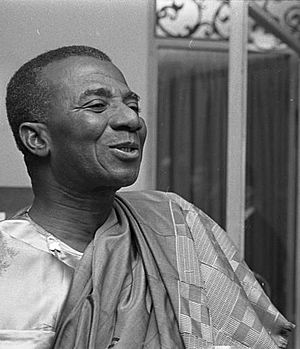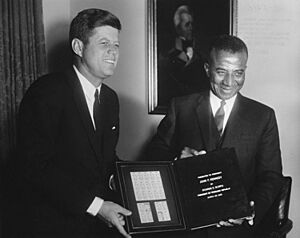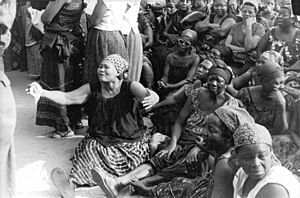Sylvanus Olympio facts for kids
Quick facts for kids
Sylvanus Olympio
|
|
|---|---|

Olympio in 1961
|
|
| 1st President of Togo | |
| In office 12 April 1961 – 13 January 1963 |
|
| Prime Minister | None |
| Preceded by | Office established |
| Succeeded by | Emmanuel Bodjollé |
| 1st Prime Minister of Togo | |
| In office 27 April 1960 – 12 April 1961 |
|
| President | None |
| Preceded by | Office established |
| Succeeded by | Joseph Kokou Koffigoh |
| Personal details | |
| Born |
Sylvanus Épiphanio Olympio
6 September 1902 Kpandu, Togoland |
| Died | 13 January 1963 (aged 60) Lomé, Togo |
| Cause of death | Assassination |
| Political party | Party of Togolese Unity |
| Spouse | Dina Grunitzky (1903–1964) |
| Relations | Octaviano Olympio (uncle) Chico Olympio (uncle) Harry Olympio (nephew) Nicolas Grunitzky (brother-in-law) |
| Children | Gilchrist Olympio |
| Parents | Epiphanio Elpidio Olympio Fidélia Afé Nanaga |
Sylvanus Épiphanio Olympio (born September 6, 1902 – died January 13, 1963) was an important leader from Togo. He served as the first Prime Minister and then the first President of Togo. He led the country from 1958 until he was killed in 1963.
Olympio came from a well-known family in Togo. His uncle, Octaviano Olympio, was one of the richest people there in the early 1900s. Sylvanus Olympio studied at the London School of Economics. After that, he worked for a big company called Unilever. He even became the general manager for their business in Africa.
After World War II, Olympio became a key figure in Togo's fight for independence. His political party won the 1958 election. This made him the Prime Minister. Togo became fully independent in 1960. Olympio then won the 1961 election, becoming the country's first president. Sadly, he was assassinated during a military takeover in 1963.
Contents
Early Life and Work
Sylvanus Olympio was born on September 6, 1902. His birthplace was Kpandu, in what was then German Togoland. This area is now part of Ghana. His family was well-known and had a history in trade. His grandfather, Francisco Olympio Sylvio, was a Brazilian trader. His uncle, Octaviano Olympio, built a successful business in Lomé. Lomé later became the capital city.
Sylvanus went to a German Catholic school in Lomé. After that, he studied economics in London, England. He attended the London School of Economics. After finishing his studies, he started working for Unilever. He worked for them in Nigeria and the Gold Coast (now Ghana). By 1929, he was in charge of Unilever's work in Togoland. In 1938, he was promoted again. He became the general manager for all of United Africa Company's operations in Africa. This company was part of Unilever.
During World War II, France took control of Togoland. The French government was suspicious of Olympio's family. This was because they had ties to the British. In 1942, Olympio was arrested. He was held under watch in a distant city. This time in prison changed his views. He became determined to push for Togo's independence after the war.
Leading Togo to Independence
After World War II, Olympio became very active in the fight for Togo's independence. Togo was not a French colony. It was a "trustee" territory managed by France for the United Nations. Olympio sent many requests to the United Nations Trusteeship Council. He asked them to help Togo become independent. His request in 1947 was the first time someone asked the UN for help like this.
In Togo, he started a political party. It was called the Comité de l'unité togolaise (CUT). This party became the main group that opposed French control. Olympio's party often refused to take part in elections in the 1950s. They felt the French were too involved in how the elections were run.
In 1954, French officials arrested Olympio. They also stopped him from voting or running for office. But his requests to the United Nations worked. The UN limited French control over the 1958 elections. Olympio's CUT party won every elected position. The French then had to let Olympio hold office again. He became the Prime Minister of the Togo colony. He immediately started working towards full independence.
From 1958 to 1961, Olympio was Prime Minister. He also held other important roles. He was the minister of finance, foreign affairs, and justice. In 1961, Togo moved towards full independence. The country voted for a president and approved a new constitution. Olympio won the election with over 90% of the votes. He became the first President of Togo.
Togo's Place in the World
As president, Olympio wanted Togo to have strong ties with Britain and the United States. In 1962, he visited the United States. He had a friendly meeting with President John F. Kennedy. Olympio was good at connecting with leaders from both British and French-speaking African countries. He spoke both languages well.
Togo and Ghana
A big challenge for Olympio was the difficult relationship with Ghana. Ghana's leader, Kwame Nkrumah, and Olympio were friends at first. They worked together to gain independence for their countries. But they disagreed about the western part of the old German colony. This area had become part of Ghana. The disagreement caused problems for the Ewe people, whose land was split.
Nkrumah wanted Togo and Ghana to unite as one country. Olympio wanted the eastern part of the German colony to return to Togo. Their relationship became very tense. Olympio even called Nkrumah a "black imperialist." Nkrumah often threatened Olympio's government.
After 1961, things got worse. There were attempts to kill both leaders. Each leader accused the other of being behind these plots. People who opposed Nkrumah went to Togo. People who opposed Olympio went to Ghana. This made the situation very tense.
Togo and France
At first, the French government was not friendly towards Olympio. After he became president in 1961, France worried. They thought Olympio was too close to British and American interests. Olympio tried to avoid relying on foreign aid. When he needed help, he preferred German aid over French aid. He did not join alliances between France and its former colonies. Instead, he built connections with former British colonies like Nigeria and with the United States.
Eventually, he started to improve relations with France. When relations with Ghana were at their worst, he made a defense agreement with France. This was to help protect Togo.
Togo's Internal Affairs
Olympio focused on careful spending and developing Togo. He wanted to avoid relying on outside help. He also limited the power of opposition political parties.
He was especially careful with military spending. At first, Olympio wanted Togo to have no army after independence. But because of threats from Ghana, he agreed to a small military. It had only about 250 soldiers. Many French soldiers from Togo were returning home. They wanted to join the Togolese military. But the army was too small to take them all.
Leaders in the Togo military, like Emmanuel Bodjolle and Kléber Dadjo, asked Olympio to increase funding. They wanted to enlist more former French soldiers. But Olympio refused. On January 7, 1963, Dadjo again asked to enlist more troops. Olympio reportedly tore up the request.
During Olympio's presidency, Togo became mostly a one-party state. In 1961, there was an attempt to kill Olympio. Nicolas Grunitzky's party and the Juvento movement were blamed. After this, opposition parties were outlawed. Some opposition leaders were jailed or forced to leave the country. This meant Olympio and his party had a lot of power.
Assassination
Just after midnight on January 13, 1963, soldiers broke into Olympio's house. His wife and he were woken up. Before sunrise, Olympio's body was found near the U.S. Embassy. This event was the first military takeover in the newly independent French and British colonies in Africa. Olympio is remembered as the first president in Africa to be killed during a military coup.
Gnassingbé Eyadéma, who later became president, said he was the one who shot Olympio. He said Olympio was trying to escape. Emmanuel Bodjollé led the government for two days. Then, the military set up a new government. Nicolas Grunitzky became president, and Antoine Meatchi became vice president.
This assassination shocked many countries in Africa. Guinea, Liberia, Ivory Coast, and Tanganyika spoke out against the coup. Only Senegal and Ghana recognized the new government at first. Because of the coup, Togo's government was not allowed to attend the meeting that formed the Organisation of African Unity later that year.
Aftermath
After the coup, Togo's army grew a lot. It went from 250 soldiers in 1963 to 1,200 by 1966. In 1967, there were protests in the Ewe region. This was Olympio's ethnic group. The military, led by Eyadéma, took over the government from Grunitzky. Eyadéma then ruled Togo from 1967 until 2005.
Olympio's family lived in exile for many years. They only returned to Togo when the country started to become more democratic. Olympio's son, Gilchrist Olympio, now leads a major opposition party in Togo.



